|
|
|
Sort Order |
|
|
|
Items / Page
|
|
|
|
|
|
|
| Srl | Item |
| 1 |
ID:
116388
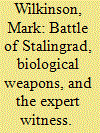

|
|
|
|
|
| Publication |
2012.
|
| Summary/Abstract |
In studying the sources for British foreign policy in the twentieth century we need constantly to remember that we are dealing with a laundered archive.
-Christopher Andrew, 1987 1
The problems associated with the researching of intelligence-related issues have been well documented. The ever-growing and increasingly diverse community of academics immersed in the study of intelligence share a range of common problems related not just to access to material, but also the verification of that material when it is obtained. 2 Indeed, the relative precariousness of much of the work in the field of Intelligence Studies is well recognized. Epistemologically, one of an academic's most significant challenges is attempting to verify potentially valuable material that has come from a limited or fragmentary range of sources. 3 Although the majority of researchers working in the field of Intelligence Studies trained as diplomatic, military, or colonial historians of the twentieth century, in fact, their problems are more inclined to resemble those of historians examining much earlier periods, where documentary evidence is thin. 4 Sometimes they might even resemble the intelligence officers that they are studying, trying to assess a potential "scoop" that has come in from a beguiling, but problematic, single source.
|
|
|
|
|
|
|
|
|
|
|
|
|
|
|
|
| 2 |
ID:
182603
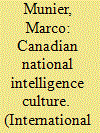

|
|
|
|
|
| Summary/Abstract |
This paper seeks to understand the nature and characteristics of Canadian national intelligence culture post–Cold War using the analytical insights of the strategic culture and intelligence culture literature. Previous studies have focused on an organizational description or historical studies of Canadian intelligence during the Cold War or after 9/11. Yet, no studies have examined the characterization of a national intelligence culture in Canada and proposed to contextualize the Canadian intelligence system in light of its national intelligence culture. Building on a culturalist approach of national intelligence systems, this paper proposes an operationalization of the national intelligence culture concept drawn on the strategic and intelligence culture literature. The paper concludes that Canada’s national intelligence culture is mostly defensive and minimalist. However, we note that recent changes in the Canadian intelligence apparatus have led to a gradual evolution of Canadian intelligence from defensive to offensive.
|
|
|
|
|
|
|
|
|
|
|
|
|
|
|
|
| 3 |
ID:
169006
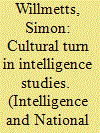

|
|
|
|
|
| Summary/Abstract |
This article explores an emerging “cultural turn” in intelligence studies, which, if fully realized, could entail the expansion of the discipline to include new methodologies and theories, and a more integrative understanding of historical causality that locates intelligence agencies within the widersocio-cultural domain they inhabit. It has two parts. The firstexpands upon what I mean by a new ‘integrative’ understanding of historical causality. The second explores three areas of interest for intelligence scholars where the “cultural turn” has clear and important implications: the study of secrecy, publicity, and “mentalities”.
|
|
|
|
|
|
|
|
|
|
|
|
|
|
|
|
| 4 |
ID:
099130
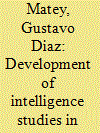

|
|
|
| 5 |
ID:
158765
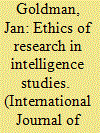

|
|
|
| 6 |
ID:
103570
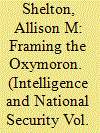

|
|
|
|
|
| Publication |
2011.
|
| Summary/Abstract |
Despite some arguments to the contrary, I argue that because ethics benefit, rather than harm, the intelligence profession they should be considered an inherent part of intelligence studies. The literature largely presents intelligence ethics as a two-sided debate between teleologists and deontologists. I propose that ethical justifications should instead be considered along a progressive spectrum drawn from the work of moral psychologist Lawrence Kohlberg. Such a spectrum has numerous applications for gauging the moral arguments of individual practitioners of intelligence. I illustrate this using the dilemma of targeted political assassination - first in a hypothetical context, and finally using examples from the investigations of the 1975 Church Committee.
|
|
|
|
|
|
|
|
|
|
|
|
|
|
|
|
| 7 |
ID:
099129
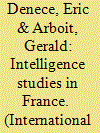

|
|
|
| 8 |
ID:
087556
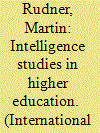

|
|
|
|
|
| Publication |
2009.
|
| Summary/Abstract |
Intelligence Studies as an academic discipline was slow to develop in universities. Perhaps the cause was the secrecy attaching to intelligence matters, or the reluctance of academe to engage with clandestine services, or the fear of being subverted by covert organizations, but universities in most countries seemed disinclined to embark on teaching or research programs relating to the Intelligence domain. A few universities, most notably in the United States, United Kingdom, Canada, Germany, and Israel, offered individual courses on intelligence Studies topics during the Cold War era, though mainly in the field of intelligence history.
|
|
|
|
|
|
|
|
|
|
|
|
|
|
|
|
| 9 |
ID:
162656
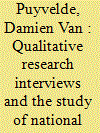

|
|
|
|
|
| Summary/Abstract |
This article explores the rationales for using interviews as a research method to study national security intelligence, and provides a step-by-step guide for researchers to prepare, conduct, and use interviews in research fields limited by government secrecy. The epistemological and methodological challenges posed by qualitative interviews in the field of intelligence studies are not fundamentally different from those faced in the broader field of international relations. However, government secrecy exacerbates these challenges and increases the need to carefully design and conduct interviews in intelligence research. Scholars of international relations can draw lessons from the best practices of intelligence researchers to overcome these challenges. At the same time, contemporary methodological and epistemological developments in the field of international relations have the potential to broaden the study of intelligence.
|
|
|
|
|
|
|
|
|
|
|
|
|
|
|
|
| 10 |
ID:
119431
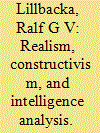

|
|
|
|
|
| Publication |
2013.
|
| Summary/Abstract |
The current rapid expansion of Intelligence Studies 1 is being driven by an increased need for intelligence in an unpredictable post-post Cold War world 2 that features complex operational contexts requiring special expertise, 3 private contractors increasingly performing core intelligence functions, 4 and intelligence missions expanding into completely new fields such as humanitarian action. 5 These trends, unlikely to be reversed in the immediate future, create a demand for the academic training of personnel in growing and diversifying intelligence communities. This will in turn generate an inherent pressure to further establish Intelligence Studies as a separate academic discipline. Not surprisingly, the hitherto fruitless search for a "theory of intelligence" has been rekindled. 6 Considering developments in adjacent disciplines, epistemological issues will, in all likelihood, increasingly come into focus. 7 Among them: What is "knowledge" in intelligence, and what counts as "true" or "justified" knowledge, if any?
|
|
|
|
|
|
|
|
|
|
|
|
|
|
|
|
| 11 |
ID:
118367
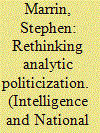

|
|
|
|
|
| Publication |
2013.
|
| Summary/Abstract |
Politicization as a term used in intelligence studies is poorly defined, conceptualized and operationalized. Despite the negative connotations associated with the word politicization that equate it with a form of corruption, it is not entirely clear what it is a corruption of. In short, the concept of politicization is for the most part analytically useless. This article critiques the existing status quo conceptualization for being overly broad and insufficiently nuanced, explores the nature of analytic politicization as a subset of politicization writ large, and replaces it with a narrower conceptualization that explains what makes analytic politicization bad and deserving of condemnation. Based on this evaluation, one can conclude that much of what is considered to be politicization in a corrupted sense is really just a naturally-occurring consequence of analysis and interpretation in a policy or political context.
|
|
|
|
|
|
|
|
|
|
|
|
|
|
|
|
| 12 |
ID:
149300
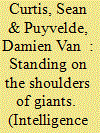

|
|
|
|
|
| Summary/Abstract |
This study takes stock of the field of Intelligence Studies thanks to a quantitative review of all the articles published in the two main journals in the field: Intelligence and National Security and the International Journal of Intelligence and CounterIntelligence. Particular attention is paid to the diversity of the authors publishing in these two journals and the evolution of the issues they discuss. Publications in the field are widely authored by males based in the United States and the United Kingdom who write about Western intelligence and security organizations. Recent years have seen a slight diversification in the field but further efforts will be necessary to develop a more eclectic body of researchers and research on intelligence and national security.
|
|
|
|
|
|
|
|
|
|
|
|
|
|
|
|
| 13 |
ID:
131110
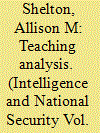

|
|
|
|
|
| Publication |
2014.
|
| Summary/Abstract |
A common substantive topic in intelligence studies is the analysis process. The addition of active-learning techniques to reinforce key concepts like competitive analysis, 'wheat' versus 'chaff', and the different 'ints' of intelligence can be an important supplement to existing teaching methods. Moreover, a deeper appreciation of the intelligence analysis process is likely to be best achieved through simulation learning. Drawing on the growing literature that recognizes active learning and simulations as important pedagogical tools, this teaching note presents an original active-learning simulation for the college-level intelligence studies classroom in which students face an analysis challenge that highlights different components of the analysis process. This simulation increases appreciation for intelligence analysis and serves as a student-friendly method for enhancing intelligence studies pedagogy.
|
|
|
|
|
|
|
|
|
|
|
|
|
|
|
|
| 14 |
ID:
103667
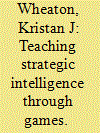

|
|
|
| 15 |
ID:
145237
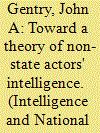

|
|
|
|
|
| Summary/Abstract |
The literature on intelligence contains many laments that scholars of intelligence have not developed widely accepted theories, or even definitions, of intelligence. This paper describes, compares, and modestly theorizes about intelligence-related activities of two variants of non-state actors – violent insurgent/terrorist groups and advocacy NGOs – focusing on their counterintelligence and covert action-like activities. These groups operate in some ways similarly to, and in other ways dramatically different from, states' intelligence services. This comparative analysis extends the scope of intelligence studies and offers suggestions for additional research.
|
|
|
|
|
|
|
|
|
|
|
|
|
|
|
|
| 16 |
ID:
119425
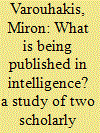

|
|
|
|
|
| Publication |
2013.
|
| Summary/Abstract |
The academic discipline of Intelligence studies is a rather young field, especially when compared to other disciplines in the social sciences, humanities, and others. Sherman Kent first called attention to the lack of "intelligence literature" back in 1955, 1 the year that the Central Intelligence Agency published the first issue of its journal Studies in Intelligence. 2 Some two decades later, the Agency also created a Center for the Study of Intelligence, which opened its doors in 1974. 3 Moreover, during the following four decades, several peer-reviewed journals were launched in the area of intelligence-including the UK-based Intelligence and National Security and the U.S.-based International Journal of Intelligence and CounterIntelligence back in the mid- and late 1980s. 4 Two more journals followed some years later, the Germany-based Journal of Intelligence History in 2001 and the European Journal of Intelligence Studies in 2007.
|
|
|
|
|
|
|
|
|
|
|
|
|
|
|
|
|
|
|
|
|